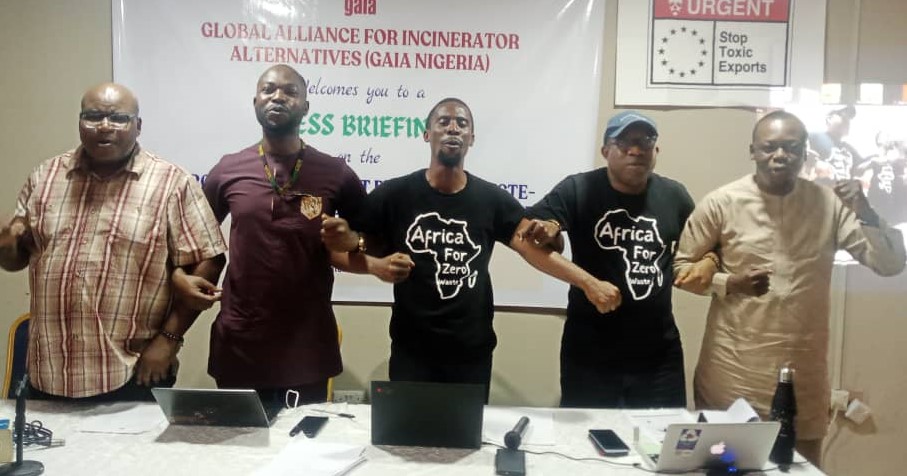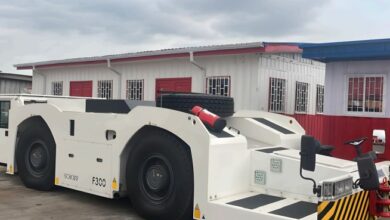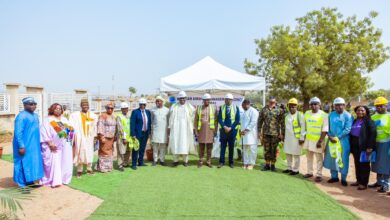
Executive Director of Renevlyn Development Initiative (RDI), Philip Jakpor (right); Dr. Leslie Adogame of Sustainable Research and Action for Environmental Development (SRADev); Weyinmi Okotie of Global Alliance for Incinerator Alternatives (GAIA) Nigeria; Benson Dotun Fasanya of the Centre for Earth Works (CFEW) and Akpan Anthony of Pan-African Vision for the Environment (PAVE) at a media briefing in Lagos
By Edu Abade
A coalition of environmental activists and climate crusaders under the aegis of the Global Alliance for Incinerator Alternatives (GAIA) have faulted plans by the Lagos State Government to build waste-to-energy incinerator plants in Epe, Ikorodu and other parts of the state.
In their quest for a just, toxic-free and zero waste world, the advocates urged the Lagos State Government led by Governor Babajide Sanwo-Olu to halt plans to adopt the Epe Waste-to-Energy Incinerator, adding: “We strongly recommend that the state government immediately stop its plans to build waste-to-energy incinerator plants and impose a moratorium on the building of any waste incineration plants across the state.”
Members of the coalition, who were drawn from different parts of Nigeria stated this, yesterday, at a media briefing on The Urgent Call to Halt Plans for Waste-to-Energy Incinerator in Lagos State, also charged the state government to urgently adopt a zero waste approach to mitigate the impacts on the environment.
“We strongly urge the Lagos State Government to prioritize the implementation of zero waste strategies, which exemplify a truly circular economy-driven strategic approach to resource management and preservation, such as reduction of waste generation, source segregation, recycling, composting and reuse programmes,” they stressed.
The groups are, Sustainable Research and Action for Environmental Development (SRADev); Pan-African Vision for the Environment (PAVE); Sustainable Environment Development Initiative (SEDI); Community Development Advocacy Foundation (CODAF); Environmental Rights Action/Friends of the Earth Nigeria (ERA/FoEN) and Green Knowledge Foundation (GKF). Others are the Centre for Earth Works (CFEW); Lekeh Development Foundation; Community Action Against Plastic Waste (CAPws); Policy Alert; Young Farmers Network and Ecocykle.
They also enjoined the Lagos State Government to engage in broader consultation with the public and civil society organizations, maintaining that a comprehensive and transparent consultation process should involve the fence-line communities, environmental activists, waste management experts and public engagement to accurately inform the public about the potential environmental, social and health implications of the proposed incinerator on communities in Epe and their ecosystems.
Furthermore, this process should be inclusive and should prioritize meaningful, equitable participation of all impacted right holders, upholding Free, Prior, and Informed Consent (FPIC), which means incorporating waste pickers, waste workers, and fence-line communities throughout the project lifecycle, starting from the development planning stage.
In his intervention, Weyinmi Okotie of GAIA, who spoke in company of other partners including Dr. Leslie Adogame of SRADev, Benson Dotun Fasanya of CFEW and Akpan Anthony of PAVE, among others urged concerned citizens, environmental organizations and stakeholders to join the ‘critical fight’ for a cleaner, healthier Lagos and protect the environment for future generations.
Describing the development as ‘a matter of great urgency’ Okotie said the Lagos State Government should avoid bequeathing a ‘toxic legacy’ on the state, adding: “We advocate a shift away from incineration towards a ‘zero waste’ approach. This means reducing waste at its source, composting organic materials, and maximizing recycling.
“GAIA supports local efforts to implement these solutions and challenge policies that promote incineration. Our goal is a just and sustainable world where communities are empowered to manage waste responsibly and live in a healthy environment. In Nigeria, GAIA members comprise over 11 public interest NGOs and civil society groups spread across Nigeria but are in Lagos today in solidarity with its members.”
Also speaking, Adogame maintained that Lagos State should not adopt outdated technologies that are being phased out in the Global North, stressing that implementing a waste-to-energy incinerator in Lagos contradicts the city’s aspiration to be a leader in sustainability and innovation, especially with its growing interest and recognition in climate change advocacy.
“If Lagos adopts this flawed approach, it sets a dangerous precedent for the rest of Nigeria and Africa. Moreover, a study by the University of Plymouth in 2012 found that a sea-level rise of three to nine feet (approximately 1 to 3 meters) would have catastrophic effects on human activities in Lagos, which has an average elevation of only 2 meters above sea level.
“Adopting a waste-to-energy technology in such a vulnerable area will pose significant environmental and public health risks. Lagos State should focus on sustainable waste management practices that do not threaten its future or that of its residents. So we are encouraging Lagos State Government to continue to be a part of the climate solution and not part of the problem.”
On his part, Dotun Fasanya, argued that waste incineration is the most expensive and least efficient way to generate energy, adding that investing between $150 million and $250 million in large, modern facilities designed by European companies might be lucrative for the companies but not for the host communities or the local government.
Citing cases of failed incinerator projects worldwide, especially in the Netherlands; he said Waste-to-Energy Incineration emits toxic pollutants to the extent that the presence of any incinerator poses substantial risks to the health and environment of communities.
“Waste-to-energy incinerators contribute to climate change as incinerators emit higher levels of CO2 per megawatt-hour compared to coal, natural gas or oil power plants; undermines sustainable zero waste practices and takes away jobs as incinerators offer relatively few jobs when compared to recycling, while recycling creates 50 times more jobs than incineration and land filling.
“Waste-to-energy incineration constitutes environmental injustice. Globally, communities have fought against its facilities because they tend to be disproportionately located in low-income settlements with heavy burden on residents accompanied by high toxicity, accidents and noise pollution,” he stated.
In his comment, Executive Director of Renevlyn Development Initiative (RDI), Philip Jakpor, said: “It is shocking that the Lagos State Government has doggedly chosen to adopt dirty technologies like the waste-to-energy incinerator plants that have become obsolete and already phased out in Europe and elsewhere instead of the cleaner renewable initiatives that safeguard jobs, preserve our environment and protect our climate.
“What the Lagos Government is embarking on is reflective of the confusion in our just energy transition journey at the state and federal levels. Over time, it has been one step forward and three or more steps backward.”
Speaking virtually, CODAF’s Director of Campaigns and Administration, Maimoni Mariere Ubrei-Joe, expressed the coalition’s deep concern over the Lagos State Government’s planned waste-to-energy project.
“In spite of our efforts to engage and dialogue with the state government, we have been met with grave silence in the last three weeks. Therefore, we chose to address our concerns through this national press conference.
“We firmly believe that the solution to waste management and climate change lies in reducing our addiction to waste, not in adopting incineration practices that will undermine human rights and environmental health. We urge the Lagos State Government to reconsider their approach and work with us towards achieving a more sustainable and equitable solution,” he said.











